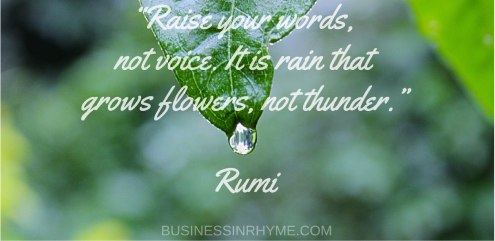Have you ever wondered how some people have like magical power to persuade others in their point of view, that they somehow win every argument?
It’s not they always have all the knowledge or the wittiest and most cunning answer. They say the right words in right moment. Not too much, not too less, but right words. It’s like they are carrying around some sort of charisma that is attractive and appealing to people, which for sure is a first step of getting someone on your side – they first have to notice you and what it is that you have to say.
I also think that we often underestimate and neglect the power of language. Spoken language, written language, body language – they all tell a specific story and influence what kind of impact in any given situation we will make. Language is what connects us but also the tool we can use to emphasize our differences, values and reasons – using the tone and voice, language can also dictate ‘the tempo and intensity’ of conversation.
To improve our persuasive skills our language needs to be memorable, distinct, inspiring and supportive. I’ve already written how poetry attributes to leadership, but there are additional benefits that I want to draw your attention to.
I do believe that in some form of another we are all born poets – as we all use, make and create language. The key point here is how we use our language and in what purposes we are putting it in. And this is where poetry brings so much beauty and creativity.
Spending time reading and writing poetry is like training, having an exercise of your brain mussels where you sharpen your senses and you learn to pay closer attention; you slow down fast-paced thoughts and you are reshaping your mind for finding greater meanings as your ability for deep listening grows. You become more aware of weaknesses and virtues of human kind and with that understating, your language reflects that. Great influencers are known for their ability to connect with people on many different levels and poetry acts as a bridge across those barriers – it becomes easier for you to accentuate your message and value.
But most importantly you see yourself and value yourself differently. You start to recognize the areas of language you can express with greater clarity:
- you find the meaning in having more alternatives;
- you find ways to communicate your cause more effectively, creatively like using metaphors and similes to explain your point view.
In any given conversation poetry can act as an ice-breaker to lessen the tension and approach the subject with more ease:
- Using poetic language can instill courage in conversation which is a catalyst for implementing change.
- In brainstorming sessions can open the doors to hidden creativity, which is essential to innovation.
- Poetry and art, in general, appeal to senses – which makes us more perceptive to risk taking, but also to strategically value situation.
Poetry, like language is ever-evolving and different, as each time we can perceive it differently. So are we, ever-adapting, by having trust in the change and confidence in the present moment able to reconcile any contrast within ourselves and our authenticity speakes for us – everyone around is already convinced.
Sometimes
if you move carefully
through the forestbreathing
like the ones
in the old storieswho could cross
a shimmering bed of dry leaves
without a sound,you come
to a place
whose only taskis to trouble you
with tiny
but frightening requestsconceived out of nowhere
but in this place
beginning to lead everywhere.Requests to stop what
you are doing right now,
andto stop what you
are becoming
while you do it,questions
that can make
or unmake
a life,questions
that have patiently
waited for you,questions
that have no right
to go away.David Whyte
If you liked this post, please share. And, if you are interested in getting more inspiration for your creativity, sign up for our free monthly newsletter.



A fantastic post!😊
LikeLiked by 1 person
Thanks Brenda 🙂
LikeLiked by 1 person
My pleasure. 🙂
LikeLiked by 1 person
Excellent post Maja. I agree that we are all poets and we can all use language in a positive way.
LikeLiked by 1 person
Yes, if only we could learn to use language more to appreciate life, instead of complaining. Poetry is a kind of training for me in that realm 🙂
LikeLiked by 2 people
I agree Maja. Poetry helps Mindfulness and vice-versa. It is an interesting area for discussion 🙂
LikeLiked by 1 person
Yes, it is quite philosophical approach 🙂
LikeLike
Yes, complain less…in joy more. Nice words. Thanks!
LikeLiked by 1 person
Wow! This is very powerful.
LikeLike
Thank you, glad you liked it 🙂
LikeLike
Beautifully put! 🙂
LikeLiked by 1 person
Thanks! 🙂
LikeLiked by 1 person
Thats kinda ‘brain storming’ session…
LikeLiked by 1 person
🙂
LikeLike